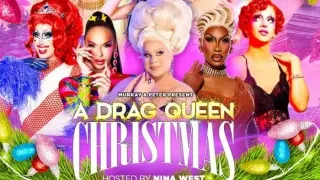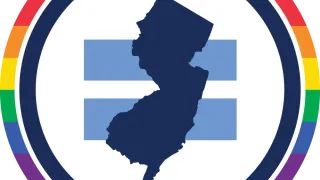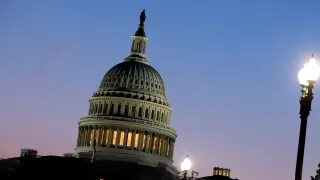May 23, 2023
SF DocFest's Cinematic Statements
Brian Bromberger READ TIME: 6 MIN.
The 22nd San Francisco DocFest will be held June 1-11 with 39 features and 47 shorts at the Roxie Theater. Artist Q & A sessions will be both in-person and virtual on-demand. The festival has come a long way from its premiere as a three-day event in an empty church in Union Square to its present 11-day incarnation presenting "the most weird and wonderful aspects of real life to the big screen."
DocFest always offers a smattering of LGBTQ-related films this year with six features plus nine short films.
Colombian filmmaker Theo Montoya's hybrid doc, "Anhell 69," opens with the 2016 signing of a peace agreement that ended decades of Colombian civil war, yet the country remains a violent place of despair for LGBTQ and young people despite legalized same-sex marriage. We witness a hearse being driven down a deserted highway and the corpse seems to be the director setting the film's grim mood.
In 2017 Montoya wanted to direct a feature movie, a gory zombie/vampire tale, and interviews Medellion queer street kids for the roles. Their answers to questions such as, "What do you do," are depressing such as the reply "scrounge around for money." Sex, drugs, and doing drag in clubs provides respite from all the gloom.
Before shooting starts, two of the actors have died from suicide and narcotic overdoses, including the lead Camilio, who was known by his Instagram name Anhell69. The film is transgressive, angry, bleak, brutal, nihilistic, where there's nothing else to live for but the here and now, since there's no future. Still "Anhell69" is a must-see film because it shows the dire results when marginalized people are ignored or persecuted.
"The Ruth Brinker Story" is a 23-minute love letter to the now legendary local founder of Project Open Hand which has provided meals for HIV/AIDS patients since 1985. At age 63 and a retired food-service worker, she started cooking meals in her own kitchen, then delivered them to ill neighbors. Many of her clients weren't dying so much of AIDS as malnutrition and loneliness. She moved her base of operations to Trinity Episcopal Church but the late gay Ambassador Jim Hormel found a more accessible building for her on Market Street. Other volunteers and gay bars raised money for its operation.
"If you were meant to do something, you just do it," says Brinker. 'Food is love' became Project Open Hand's motto, which continues to serve the elderly and homebound. If you've ever doubted how one person can make a difference or feel you're too old to fulfill a dream, this doc is mandatory. This short eulogizes a compassionate caring hero who deserves to be celebrated.
"Sean Dorsey Dance: Dreaming Trans and Queer Future," fuses dance and documentary in a profile of the local trailblazing transgender choreographer and activist. Dorsey moved to San Francisco in the early 2000s attracted to the city's history of trans and queer resistance and culture, yet discovered he was the only openly trans modern dancer and no one was showcased or hired trans artists on stage.
He sought to remedy that lack and created the artistic vision he envisioned by forming his own company. This entrancing short serves as a kind of infomercial for his latest project, "The Lost Art of Dreaming," which Dorsey imagines as a political act of resistance promoting cultural change, a show the company will tour internationally through 2024.
"Kenyatta: Do Not Wait Your Turn" introduces us to Malcolm Kenyatta who as the first queer Person of Color elected to the Pennsylvania House of Representatives (in one of its poorest districts), at age 31 entered the primary to become the Democratic Party's 2020 candidate for U.S. Senator in perhaps the most important battleground state. He would have become the first LGBTQ POC in the U.S. Senate. In his campaign he stressed wanting to advocate for the working class.
Director Timothy Harris was given total access to what was clearly an uphill battle from the get-go, as his challengers included the eventual winner Lieutenant-Governor John Fetterman and Congressman Conor Lamb ("the young Biden"), who were both more well-known and raised much more money than Kenyatta. Well-liked in the party, he's an engaging speaker, yet almost no one thinks Kenyatta's electable.
This is a standard-format documentary but presents a full-bodied portrait of a politician vying to be a force for change. The most stirring scenes are the one with his husband Dr. Matt Miller as we follow their courtship (they met on Instagram), marriage ceremony, and media presence as spouse of the candidate. Kenyatta is clearly a rising Democratic Party star. Despite his third-place loss, with his drive and ambition, his is a name you will be hearing in the near future. This film is a festival highlight.
"Satan Wants You," the closing night doc, seeks to dissect the 1980s/1990s Satanic Panic as being instigated by the bestselling memoir, "Michelle Remembers." Co-written by Michelle Smith and psychiatrist Dr. Lawrence Pazder, it details Smith's childhood ritual abuse (i.e. animal/fetal sacrifice, mutilation, cannibalism) at the hands of devil worshipers, given to them by her mother. Supposedly all these recovered grisly memories were unearthed during intensive hypnotic sessions, which were then written up by Pazder and later endorsed by the Roman Catholic Church.
The pair (who had divorced their spouses and married) appeared on every major TV talk show, inspiring mass hysteria with law enforcement officers chasing wild almost laughable allegations of Satan worshipers and child abusers, especially in preschools (the notorious McMartin case), destroying teacher's/administrator's lives with little or no evidence. It seems incredible, even hilarious, that people believed these absurd stories, which are more suitable to exploitative horror movies.
Most disconcerting is the film's suggestion we haven't learned the lessons of this moral panic and conspiracy-mongering, because the same rumors and implausible stories relating to Pizzagate and QAnon are occurring today with similar horrendous results. While there's no LGBTQ-related material in the film, it's directed by Steve Adams and Sean Horlor, a gay Canadian filmmaking team. Also, the theme of scapegoating and blaming groups for ethical/social decline is familiar territory for queer folk. Chilling, gripping yet entertaining, this doc should serve as a contemporary warning.
The short "Right to Joy" follows trans man Izzy Sederbaum as he overcomes anxiety and prejudice, after surviving a nearly fatal cougar attack while cycling in Washington state, despite still experiencing facial trauma. An accompanying friend on the ride was killed. Worse than the extreme physical pain was the emotional anguish engendered by the horrible comments on the internet following articles on the assault.
He wasn't sure he could ride again, but with friends' help he rediscovers his love of biking and advocating for diversity and inclusion in the sport. He even summons the courage to return to the site of his attack. These 14 minutes might give you the inspiration and bravery to face whatever issue might be weighing you down.
more shorts of note
"Krush the Wrestler" explores the fetishization of submission wrestling which is both primal and cathartic. A lifelong wrestler, Krush turned his talents into an on-demand video service, including scenes of nude wrestling. This is not porn and there's no sexual contact, but he does cater to the customer's fantasies. Krush sees himself as a work of art with his intense wrestling a homoerotic sight to behold.
"Chokehole: Drag Wrestlers Do Deutschland" explores a phenomenon that began in New Orleans in which drag queens, in a choreographed contest, wrestle each other with no holds barred. It uses a queer lens on a traditionally macho sport, bringing out the inherently flamboyant and camp elements of professional wrestling. Technically illegal in New Orleans, they are invited to bring their show to Germany where they are a hit, which emboldens them when they return home to secure a state proclamation that applauds Chokehole for its spirit, courage, and pride.
"Before Us" is a doc by lesbian filmmaker Hedia Maron, who discovers two older sisters who were born on a California commune in the 1960s and later placed for adoption.
"Cisco Kid" details young, solitary maverick nonbinary Eileen, who is the sole resident of a desert ghost town, after she has walked away from mainstream society, living in a place left behind by a changing world.
"Sweetheart Deal" is a cinema-verité style production about four sex workers caught in the spiral of addiction, who turn to a self-proclaimed healer offering friendship and a path to salvation from the streets inside his roadside RV.
"Tony & Denise: Cinematic Memoir of Denise D'Anne" tells the life of pioneering San Francisco transgender labor activist Denise D'Anne based on her autobiography. She launched one of the first organized recycling programs with the SF Department of Human Services.
"Undetectable Wrestler" relates the bio of Joshua Simmons, who retired from professional wrestling after testing HIV+. He maintained his undetectable status for seven years before deciding to enter the ring professionally again.
22nd San Francisco Documentary Festival, Roxie Theater, 3125 16th St. and online, June 1-11. $20, $90 (online pass) $225 (full pass). www.sfdocfest2023.eventive.org www.roxie.com
Help keep the Bay Area Reporter going in these tough times. To support local, independent, LGBTQ journalism, consider becoming a BAR member.






